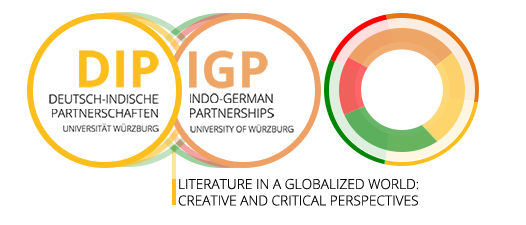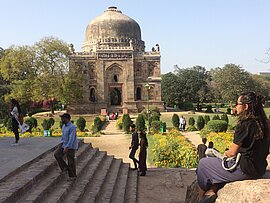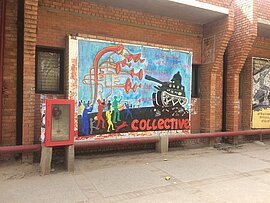Master Student Anna Frieda Kammies (Kuhn) spends two months at Jawaharlal Nehru University, Delhi


Under the aegis of the DAAD-funded project “Literature in a Globalized World” two students from the Department of English Literature at the Julius-Maximilians-Universität Würzburg were offered the opportunity to study at the renowned Jawaharlal Nehru University (JNU) in Delhi. As a master’s degree student of the interdisciplinary degree course “Neuere Literaturen” focusing on discourses of globalisation, my interest was aroused. As I was looking into soundscapes of the so-called “Global South”, the project would be a unique opportunity for me to spend two months in Delhi doing in-depth research.
Ranked one of India’s best universities, it is no surprise that for anyone interested in “post-colonial” and “globalisation” studies, JNU is somewhat of a small-scale utopia. Within the university’s vibrant student life, the exceptional enmeshment of every-day life with student politics becomes conspicuous not only when talking to students and supervisors, but also when considering the “Painting Resistance” movement that has emerged at JNU – a movement that relocates politics to site-specific art. Apart from the obvious allure of a campus as politically active as JNU, the research opportunities were unparalleled. As my Master’s thesis seeks to look at the way in which sound is articulated in a globalised, “post-colonial” setting, and at the workings of an Anglo-American hegemony within the study of sound, JNU offered me de-centred ways of looking at such discourses. As an arts and humanities student, I was able to visit a range of academic and cultural events on a day-to-day basis. For instance, I had the chance to attend a seminar that was explicitly dedicated to music in the “Global South”. Not only did this seminar make it possible for me to broaden my academic horizon, but also to make valuable contacts – ranging from students to lecturers. My prolonged stay at JNU was then a means of engaging with “post-colonial” and “globalisation” studies in a way that, as articulated by literary critic Édouard Glissant, abolished “the very notion of centre and periphery”.



